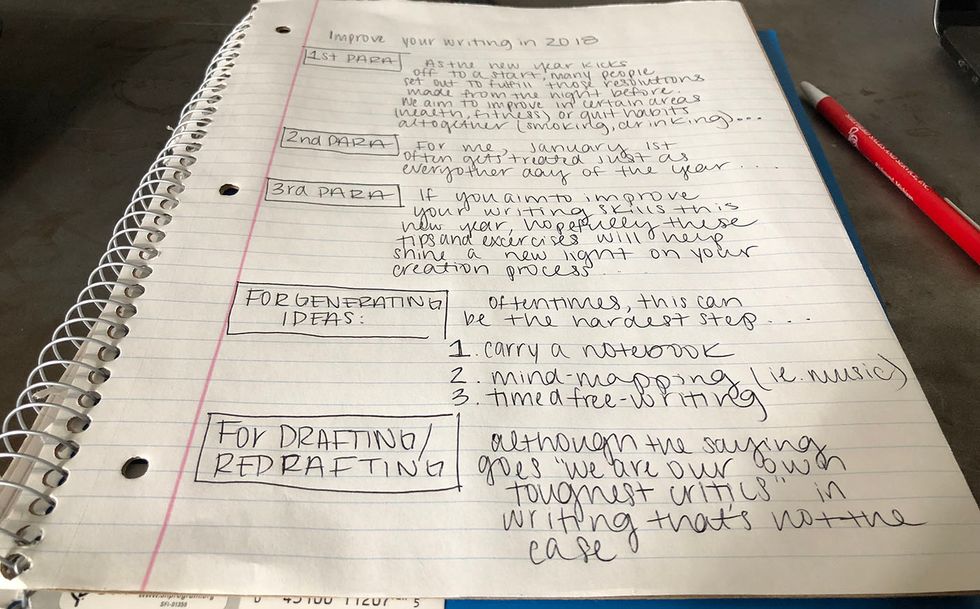As the new year kicks off to a start, many people set out to fulfill their resolutions made from the night before. Some of us aim to improve in certain areas like our health or self-control, while others aim to quit habits altogether, such as smoking or binge-watching. It is a time where we feel revitalized and ready to take on the year ahead, as new and improved versions of our past selves.
For me, January 1st often gets treated just like every other day of the year, as I rarely set specific resolutions. Instead, I aim to grow and learn from the lessons of the previous year and to improve my skills in areas of my interest, such as writing.
For those of you seeking to become better writers in the new year, or hoping to incorporate a new hobby into your lifestyle, hopefully these tips and exercises will provide you with some new methods for creating, and give your writing process a new spark.
For Generating Ideas:

1. Always carry a notepad with you
This makes an unbelievable difference. Inspiration strikes at odd and unexpected times and if you are able to record every interesting thought or question that occurs to you throughout the day, you will already have many ideas to build off of when it comes time to sit down and write. Don’t worry about filtering through your recordings, just write down the raw thoughts as they come to you, and revisit them later.
2. Practice mind-mapping
This technique is helpful if you have a general idea of what topic you want to cover, such as music. Write down your idea in the center of the page and circle it. Then start to write down every little idea, word, or phrase that you associate with the original word. This helps to narrow down your writing so that you can write in detail about some pinpointed concept, rather than writing a broad and generalized article.
3. Timed free-writing
This is one of my particular favorites and I use this strategy regularly during my writing process. Say you want to write a poem with the theme of dystopia. Write “dystopia” at the top of your notebook page, set a timer for seven minutes, and write. The trick is to make yourself write for the entire seven minutes, without necessarily thinking about what you’re writing down and instead just letting your hand fly across the page. Even if you end up writing “dystopia dystopia dystopia” for two lines straight, keep your hand moving and by the end of the seven minutes, there will usually be one or two ideas that really stick out and give you a thesis idea for your poem.
For Drafting and Redrafting:
Although the saying goes, “we are our own toughest critics,” when it comes to writing, that may not be the case. It is difficult to notice flaws in your own writing and to think of better ways of saying something. We each write in a style that makes sense to ourselves, even though it may not make sense to others. Here are two techniques I use during the drafting of almost every piece I create.
1. Make an outline
Many of us were taught how to create outlines for essays back in high school, but now that it is no longer required by a teacher, we tend to skip past this initial stage of drafting. Always remember, outlines are your friend! Before beginning with a written first draft, outline the points you want to discuss and organize your paragraphs and topic sentences. Sequencing is key to a well-written piece and with an outline, you will have a clear idea of where to begin and where to end your writings.
2. Make a new outline after writing a first draft
This exercise might sound like it will add unnecessary time onto your creation process, but it is a great way to come up with better ways of expressing your ideas. After writing out your first draft, turn to a new page and write a new outline for your piece, including topic sentences for each paragraph. Approach the subject as if it was your first time writing about it.
For sticking with it:
1. Join a writing platform
If you really want to take your writing to the next level and force yourself to be consistant with content output, consider joining a writing platform or starting a blog. Since I became a creator for Odyssey, I am constantly practicing my writing skills and gaining inspiration from the community of writers of which I am a part. Also, with the presence of an audience, my writing has taken on a greater sense of purpose and I feel obligated to write consistently, and not just for myself anymore.
2. Set aside time each day for writing
Dedicate a specific time of day to your writing. Maybe it will just be the 10 minutes after you wake up in the morning and your writing will consist of your sleepy, waking thoughts. Even if your schedule only allows for a few spare moments, incorporate writing into your daily routine, as improvement is always accompanied by practice.
3. Branch out of your comfort zone
If you tend to write personal, blog-style pieces, take a stab at flash fiction or poetry. Don't be afraid to experiment with a new style, for it may end up being your new favorite genre.
Writing is a truly marvelous ability as it allows us to express our thoughts through words and exchange ideas easily. It can be immensely therapeutic by helping us to gain a better understanding of not only ourselves, but also of the people around us. If you seek to become a better writer in this new year, utilize these exercises and practice writing daily, as even the best writers did not stem from nothing.


















